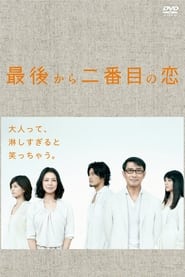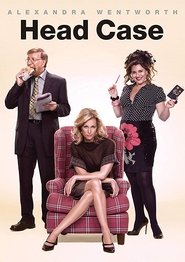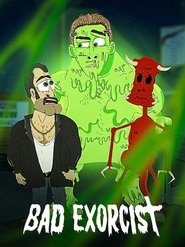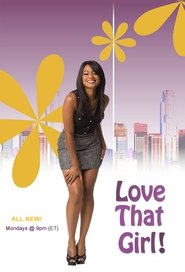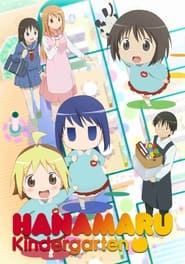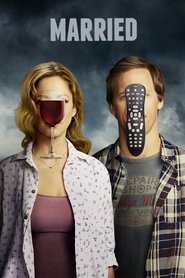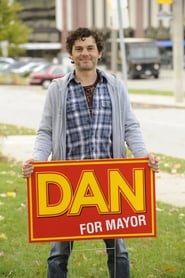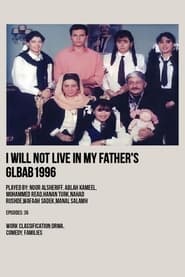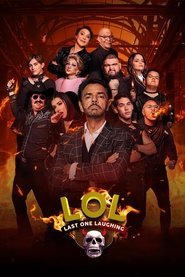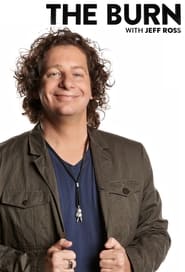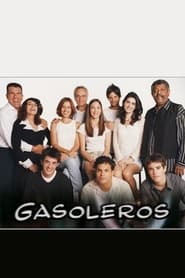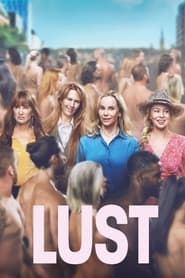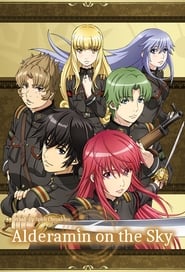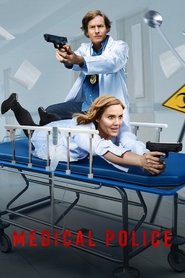Comedy TV Series - Page 229
-
Second to Last Love
2012
Second to Last Love
2012
star 7Chiaki Yoshino is a TV producer. She is 45-years-old and single. Chiaki Yoshino worries about her health and her later years rather than dating. She hopes to buy an old house and live there with a friend when she gets older. Chiaki then goes to Kamakura, Japan to look for a house. There, she meets a 50-year-old single man Wahei Nagakura. Wahei's first wife died and he has one child. Their love story begins ... -
Head Case
2007
Head Case
2007
star 6.3Meet Therapist Dr Elizabeth Goode. She's brash, unconventional, judgmental, but undeniably thriving as the "it" therapist to Hollywood's maladjusted elite. On a daily basis Dr Goode dishes her own unique methodology to a waiting room filled with a who's who from the world of entertainment, sports and music. (Celebrities appear on the show as themselves.) -
Bad Exorcist
2020
Bad Exorcist
2020
star 5.5No demon is safe as Bogdan Boner, the alcohol-loving, self-taught exorcist-for-hire, returns with more inventive, obscene and deadly deeds. -
Love That Girl!
2010
Love That Girl!
2010
star 7Love That Girl! is an American sitcom created by Bentley Kyle Evans and starring Tatyana Ali. -
Hanamaru Kindergarten
2010
star 6.6Anzu, Hiiragi, and Koume are three girls who attend the lively Hanamaru Kindergarten. There they have lots of adventures with their classmates and with Naozomi Tsuchida, their teacher who has just started working fresh out of school. -
Married
2014
Married
2014
star 6.2Married is a half hour comedy about being miserably in love. Russ and Lina Bowman can barely remember what life was like before kids, debt, and suburbia rained on their romance -- but every once in a while, in between the arguments about their declining sex life and who's driving carpool, they are reminded what drew them together in the first place -- they're best friends. The show also features Russ and Lina's friend AJ, who is recently divorced and pretending he's over his wife, and their other friend Jess, who is married to a much older man who can't keep up with her. -
F.C. De Kampioenen
1990
F.C. De Kampioenen
1990
star 7.2F.C. De Kampioenen, was a long-running Flemish sitcom chronicling the adventures of a fictional local football team. It aired on the Belgian-Flemish channel één between 1990 and 2011, for 21 seasons with 273 half-hour long episodes, making it one of the most successful comedy programs ever on Belgian television. In 2009 a film had been planned, but has since been cancelled following complaints by the actors about the script. In 2012 the crew announced a new script was written and a movie will be produced. The movie is to be released in December 2013. The series relies heavily on stereotypical characters and farce for its humour. The story is mainly set around a few members of the football club who regularly visit the club canteen before or after a soccer training or match. The canteen is run by Pascale, who is in a relationship with Maurice. The football club is sponsored by the owner of a sausage factory, Balthazar Boma. Next to the field is an antiques shop, owned by the fraudulent Fernand. Most of -
Dan for Mayor
2010
Dan for Mayor
2010
star 4.5Dan Phillips is a 30-something bartender who lives and works in the ordinary city of Wessex. Dan's had the same friends since grade school, his most prized possession is a vintage Ms. Pac-Man game and his last serious relationship was with a girl who is now engaged to someone else. His life seems to be firmly on the path to more of the same... until a chance comment suddenly puts him in the running for mayor of Wessex. -
I Won't Live in My Father's Robes
1996
star 8.3The events of the series revolve around the story of the rise from the bottom to the top of Abdel Ghafour Al Borai (Noor Al Sharif), starting from the agency of Hajj Ibrahim Sardinah (Abdul Rahman Abu Zahra) until he becomes a private business owner who makes a fortune, during which he has admired Fatima (Abla Kamel), a saleswoman. Al-Kushari, whom he admired, passes the days and marries Fatima and gives birth to his son Abdel-Wahhab (Mohamed Riyad), and four girls (Sunni, Bahira, Nafisa, and Nazira), and despite the availability of the elements of happiness in the life of Abdel Ghafour Al-Borai, he suffered from the separation of his only son. About him, and Abdel Wahab's insistence on building a very special world away from his father and his influence. -
LOL: Last One Laughing
2018
star 7.4An unscripted variety series from Mexico in which ten professional comedians compete for a cash prize by trying to make each other laugh. The one who refrains from laughing the longest, while forcing other contestants to laugh first, is the winner. -
The Burn with Jeff Ross
2012
star 7The Burn with Jeff Ross is a comedy panel show hosted by comedian Jeff Ross on Comedy Central. The show debuted on August 14, 2012, and is executive produced by Ross himself. The program features Ross roasting a wide variety of targets, along with guest appearances by fellow comedians who make up a panel of roasters. The show was renewed for a second season by Comedy Central, which premiered January 8, 2013. -
Gasoleros
1998
Gasoleros
1998
The plot is based on the daily life of the Panigasi family, an impoverished middle-class family. -
Sunflower
2021
Sunflower
2021
star 6.4When Mr. Kapoor of Sunflower society is found dead, the cops arrive and interrogate the neighbours. In a society full of quirky characters, who must have killed Kapoor and why? -
Falling Into You
2022
Falling Into You
2022
star 8.7Duan Yucheng, a passionate high jumper, struggles with his height but finds guidance from coach Luo Na. Determined to succeed, he joins her university team, facing injuries, failures, and doubt along the way. As he competes from school-level to national championships, he pushes through every challenge, finding joy in his progress. Through it all, the track remains his greatest passion and driving force. -
Lust
2022
Lust
2022
star 6.7After her nationwide study suggests that sex is the highway to health, Anette and her three lifelong friends begin to question how to keep their own sex lives from being sidelined by careers, kids, partners, and the realities of life. -
Patalliro!
1982
Patalliro!
1982
star 8Patalliro du Malyner VIII is the crown prince of the Diamond producing country of Malynera. Known for being both ugly, mischievous and with a bad personality, he is nonetheless a strong-willed prince and a good son to his father the king. Many enemies of the throne, including the Prime Minister of Malynera himself, are off to get rid of him and take control of the rich nation. Thus, Bancoran, his haughty but extremely handsome bodyguard, is off to protect the obnoxious prince, even from Bancoran's own lover, the extremely beautiful bishounen Maraich and other bishounen assassins. -
Nina
2015
Nina
2015
star 5.8At the age of 39, Nina finds herself a trainee nurse under the orders of Léo, a 15-year-younger "girl" with a difficult temperament, and Dr. Proust, who likes to scare her ... Not easy ! Especially for all, Nina is the wife of the boss, Costa Antonakis, his ex with whom nothing is really settled despite their divorce. But after healing Lily, their daughter, for ten years, nothing scares Nina! With years spent in hospitals in contact with doctors such as nurses and health-care aides, Nina, the daughter of a great internist and a renowned obstetrician, runs the risk of disappointing them to trace her own path in the hospital universe to which she can not really escape ... Listening and care as a profession of faith, the desire to live and love as a prescription ... -
Alderamin on the Sky
2016
Alderamin on the Sky
2016
star 7.2At war with the adjacent Kioka Republic, the Katjvarna Empire. In that region, due to certain circumstances, there was a certain youth unwillingly preparing to take the High Grade Military Officer Exam. His name, Ikta. Disliker of war, lazy, admirer of women. No one predicted that that kind of Ikta would later on become a soldier referred to even as a great commander... He who survived a world embroiled in war with his superior genius, Ikta. Illustrating his dynamic, dramatic life, a splendid fantasy military history, the curtain is raised at last! -
Medical Police
2020
Medical Police
2020
star 6.4Doctors Owen Maestro and Lola Spratt leave Children's Hospital and join a secret arm of the CDC to investigate and destroy a deadly global virus.
